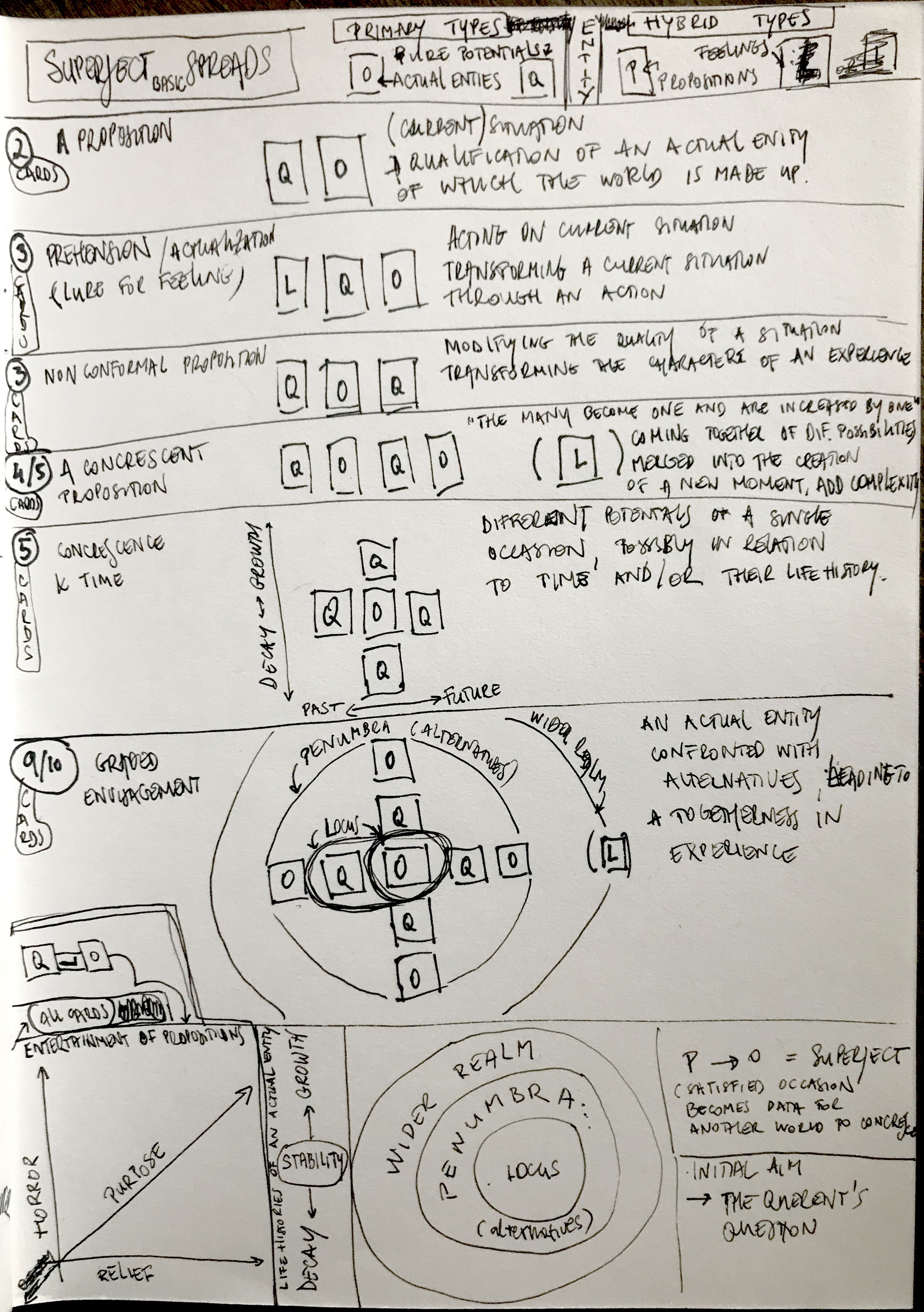6.7 KiB
(see also https://subetha.fo.am/p/superject-instructions)
primordial nature
There is urgency in coming to see the world as a web of interrelated processes of which we are integral parts, so that all of our choices and actions have consequences for the world around us.
overview
Superject is a card game grounded in the speculative philosophy of Alfred North Whitehead. It's a tool for questioning, prototyping, discussing, and feeling the world anew…
(and a couple of sentences about the backstory, playing with propositions and lures for action, the intention, open-endedness, etc.)
Number of players
A superject game can be played individually or with a group of two or more players
The cards
A superject deck is composed of three types of cards. A game can be played with one or more decks of Superject cards.
Occasions cards describe a type of experience.
Qualia cards describe the qualities of an experience.
when Occasions and Qualia are played in pairs they describe a Proposition, suggesting what a particular experience might feel like.
Lures cards suggest how a Proposition could be made manifest in the Wider Realm

Occasions and Qualia are usually played in pairs or combinations which can be referred to as Propositions

how to begin the game
The game can be played in various ways so usually begins with the players deciding on the scope and duration of gameplay. Before the first cycle, you should agree on the following conditions…
- Is the game more dependent on chance or deliberate discussion?
- How long will the game last? This could be a fixed number of cycles, a fixed amount of time, or it can remain open to see how the game develops.
- Decide if there are any specific relationships between the cards & things in the wider realm (advanced option? anything else to decide about the 'wider realm'?)
once the scope and duration of the game has been agreed…
how to play the first cycle (deliberation)
Divide deck in to O, Q & L piles. place cards face up (in the Penumbra?)
Discuss which cards could be most relevant/interesting/generative/etc
Each player takes an Occasion card in turn and places it in the Locus with a brief description of how they see the Occasion being part of the current situation.
Each player then takes a Qualia card and pairs it with any of the Occasion cards that have been played in the Locus giving a brief description of how they see the Occasion being modified by the Qualia
(lead into a conversation between the players to understand the propositions in play…)
You may want to organise the propositions by moving similar ones closer together, and the more relevant, important or interesting ones closer to the centre of the Locus.
Each player adds a Qualia card to one of the current Propositions in turn.
Once the propositions are in place select a Lure card (needs clarification: one per player per round? or pre-select all the lures to play with? or leave all available in the penumbra? select an agreed subset of the lures to draw from?)
how to continue playing (deliberation)
Each player extends the environment with either an O or Q card from the penumbra
The next player (clarify?) selects a Lure that comes into play. The Lure can be placed next to any P to “entertain the proposition”
The player then describes the Lure as a way to enact the proposition and can suggest ways that the proposition might be realised.
Other players can offer further suggestions, until the group either decides to “realise the proposition” or “entertain another proposition”
If the proposition is not realised, the Lure is discarded (in the Penumbra) and another cycle begins

how to play the first cycle (chance)
Divide deck into O, Q & L piles
Shuffle & place each pile face down
Each player takes one card from each of the O & Q piles in turn and places their cards face-up in the Locus as pairs. The O & Q cards together form a proposition.
Once all the players have created propositions by placing their cards in the Locus, they then attempt to explain how they see their proposition in relation to the current situation (expand?) this can proceed one player at a time, then lead into a conversation between the players to understand the propositions in play…
You may want to organise the propositions by moving similar ones closer together, and the more relevant, important or interesting ones closer to the centre of the Locus
how to continue playing (chance)
Each player takes either an O or Q card from the pile, and uses it to extend one of the propositions in the Locus
The next player (clarify?) selects a Lure and places it next to any P to “entertain the proposition”
The player then describes the Lure as a way to enact the proposition and can suggest ways that the proposition might be realised.
Other players can offer further suggestions, until the group agrees how to “realise the proposition”

how to realise a proposition

how does the game end?

divination / speculation
using a spread as divinatiory apparatus.
A proposition
A prehension
A Non-conformal proposition
A Concrescent proposition
Concrescence in time
Graded envisagement

etc
compare the Time Breaker Rules and/or Fluxx Rules (as pdf) or EcoFluxx rules as a variant of Fluxx.